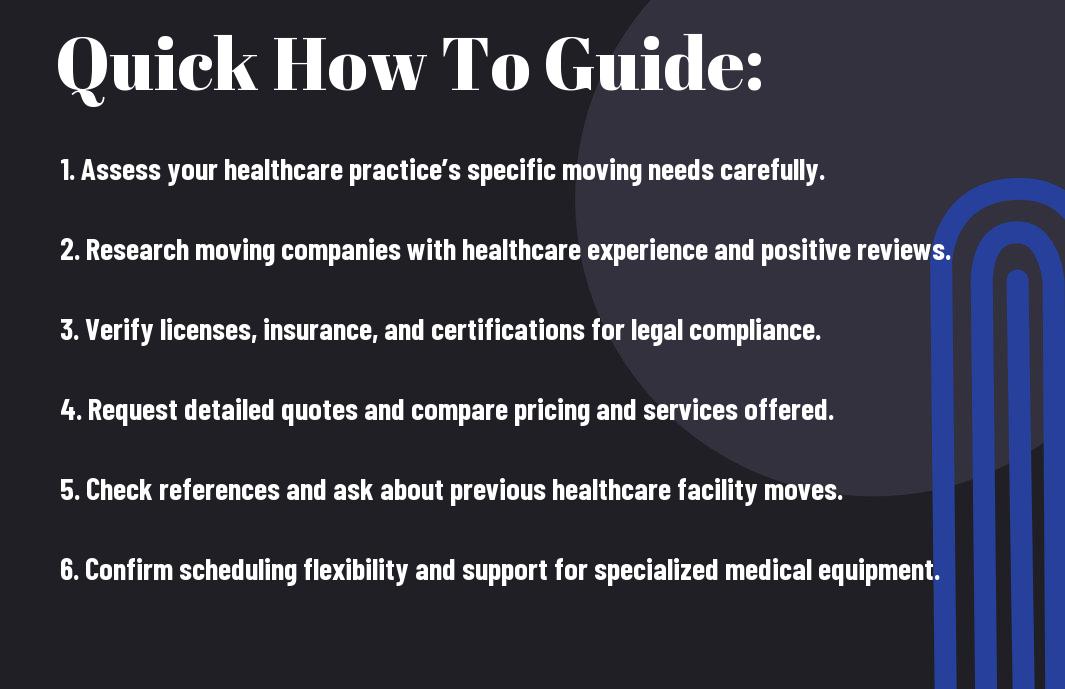Moving your healthcare practice requires careful planning and consideration to ensure that your patients’ needs are met without disruption. As you navigate the relocation process, selecting the right moving service is vital for safeguarding your valuable equipment and maintaining service continuity. In this guide, you will learn the most important factors to consider when choosing a moving service specific to healthcare practices, ensuring a smooth and efficient transition for your office.

Assessing Your Practical Needs and Logistics
Understanding your practice’s unique needs and logistical requirements is foundational to a successful relocation. Start by analyzing the size of your facility, including the number of rooms, staff, and patient capacity. This information can help you determine the scale of your move. Additionally, factor in the layout of both the old and new locations, accessibility for moving trucks, and any local regulations that might affect the transition. A detailed assessment will guide you in selecting the right moving service to ensure everything goes smoothly on moving day.
Evaluating the Size and Nature of Your Healthcare Practice
Your healthcare practice’s size and specialty dictate the complexity of the move. For example, a small general practice with limited equipment may require less planning compared to a multi-specialty clinic with extensive medical technology and fragile instruments. Consider the number of staff you employ and how their roles will be affected during the relocation. A clear picture of your practice’s operations will enable you to communicate your specific needs to potential moving services, ensuring they have the capability to handle your requirements.
Identifying Key Equipment and Supplies for Safe Relocation
Taking inventory of your imperative medical equipment and supplies is a vital step in the moving process. You want to ensure all items critical to your operations are accounted for and properly prepared for transport. This includes not only larger appliances like diagnostic machines and hospital beds but also smaller items such as examination tools and office supplies. By listing everything, you can prioritize what needs special handling to prevent damage and guarantee a seamless transition.
To ensure a smooth and safe relocation, categorize your equipment based on fragility and necessity. For instance, fragile items like X-ray machines or laboratory equipment may need custom crating and climate-controlled transportation. Usually, moving services experienced in healthcare will have protocols for such delicate items. Additionally, make a checklist of supplies like personal protective equipment (PPE), sterilization tools, and medical records that need secure transport. Prioritizing and organizing your equipment reduces the risk of loss and enhances logistics planning for your move.
The Importance of Specialized Experience in Healthcare Moves
Focusing on specialized experience ensures that your moving service understands the unique challenges and requirements of relocating a healthcare practice. This type of expertise fully addresses the nuanced demands of transporting medical equipment, sensitive patient information, and adhering to health regulations. A moving service experienced in healthcare relocations brings not only operational knowledge but also industry-specific protocols, ensuring that your practice minimizes downtime and maintains compliance throughout the process.
Understanding Regulations and Compliance in Healthcare Transportation
Healthcare transportation is governed by strict regulations designed to protect patient privacy and ensure the safety of sensitive materials. Familiarity with HIPAA and other healthcare regulations is non-negotiable for a moving service. They must navigate these laws adeptly to transport patient records and medical supplies without jeopardizing compliance. A knowledgeable moving partner will provide peace of mind that all procedures align with legal requirements throughout your move.
Evaluating Previous Experience with Similar Healthcare Practices
Looking into a moving service’s previous experience with healthcare practices provides insights into their capability and reliability. Choose a service that has successfully managed projects akin to yours, particularly in terms of scale and complexity. Ask for case studies or references to gauge how they handled challenges specific to healthcare relocations, such as specialized equipment or sensitive timing concerning patient care. A proven track record reflects not just competence but also an understanding of best practices that can be invaluable for your move.
When evaluating past experiences, consider moving services that have worked with practices similar in size and specialties to yours. For example, if you run a dental clinic, verify that the service has experience moving dental equipment like X-ray machines and sterilizers. Request details about project timelines, the adaptability of their team in high-pressure situations, and how they maintained compliance throughout the move. Engaging with a provider that has a strong portfolio in your specific field will drastically reduce your operational risks during relocation.
The Cost Factor: Decoding Moving Service Pricing
Understanding the cost of moving services for your healthcare practice involves deciphering various pricing structures and potential hidden costs. Rates can differ based on factors like distance, volume of items, and additional services like packing and unpacking. Always consider the complete financial picture to accurately gauge how the expense fits into your budget and ensures a smooth transition.
Analyzing Quotes and Hidden Fees in Moving Contracts
Not all quotes are created equal; hidden fees often lurk in the fine print of your moving contract. You must scrutinize each proposal for additional charges that could inflate the initial estimate, including costs for fuel, stairs, long carries, or even packing materials. A transparent contract upfront can save you from unpleasant surprises later on.
Balancing Cost Against Quality of Service
While lower costs can be tempting, prioritizing quality of service ensures your healthcare practice’s relocation goes smoothly. Investing in experienced movers can mitigate risks associated with damaged or lost equipment, downtime, and more. Consider potential long-term savings in efficiency and reputation that stem from choosing a reliable provider.
Quality should never be sacrificed for cost savings alone, especially in healthcare, where specialized equipment and sensitive records are at stake. A slightly higher quote might reflect extensive experience, specialized training, and appropriate insurance coverage, all of which can protect your assets during the move. Prioritize moving services that not only meet your budget but also have a track record of reliability and customer satisfaction to ensure a successful transition. Ultimately, a well-executed move can lead to operational efficiencies and improved patient care, making the investment worthwhile.
Reputation Matters: Gauging Moving Companies
Assessing a moving company’s reputation provides invaluable insights into their reliability and service quality. Start by looking for companies that have been recognized in the industry or received awards for their exceptional service. Engaging with local healthcare organizations or associations can also yield trustworthy recommendations, ensuring you get a mover with a solid track record in handling sensitive healthcare equipment or information.
Seeking Out Reliable Reviews and Testimonials
Reading verified reviews and testimonials from other healthcare practices can illuminate the strengths and weaknesses of a moving company. Look for patterns in feedback, especially concerning punctuality, professionalism, and care with equipment. Websites like Yelp or Google Reviews, as well as testimonials on the moving company’s own site, can serve as valuable resources in your decision-making process.
Importance of Certifications and Professional Affiliations
Certifications and affiliations with professional bodies validate a moving company’s commitment to maintaining high industry standards. Certifications from organizations such as the American Moving and Storage Association (AMSA) can signify that a company adheres to ethical practices, rigorous safety standards, and employee training protocols. Being affiliated with local or national healthcare associations enhances a mover’s credibility, indicating they understand the unique requirements of transporting sensitive medical equipment and records securely.
In an industry where precision and care are paramount, certifications, such as ISO 9001, demonstrate a moving company has met internationally recognized standards for quality management systems. This commitment to excellence not only reflects a company’s capability in performing successful relocations but also assures you that they handle your healthcare practice’s specific needs with the utmost professionalism. Additionally, some companies may invest in specialized training for their movers, emphasizing safety and efficiency when dealing with delicate medical machinery. Engaging with movers who possess these credentials promotes peace of mind as you prepare for your practice’s transition.
Questions to Ask Before Committing to a Moving Service
Before signing any contracts with a moving service, formulate a list of vital questions to ensure you make an informed choice. Inquire about the company’s experience with healthcare practices specifically, as specialized knowledge can be important for handling sensitive equipment and records. Additionally, ask about their insurance coverage and what happens in the event of damage or loss during the move. Delving into their timeline for the move and whether they can accommodate your schedule is equally vital. Gathering clear answers to these questions can help avoid surprises later on.
Clarifying Guarantees and Service Level Agreements
Understanding the guarantees and service level agreements (SLAs) provided by the moving service protects your interests and ensures accountability. Ask about their policies on timeliness, handling of equipment, and what compensation you’ll receive in case of delays or damages. Clarifying these details upfront gives you peace of mind as your practice transitions to a new location, setting clear expectations for both parties involved.
Understanding the Communication Process Before, During, and After the Move
Clear communication is vital throughout the moving process, and you need to grasp how your chosen moving service reinforces this. Ask how they’ll keep you updated on the progress before the move, who your primary point of contact will be, and how they handle communication during the move itself. Post-move, inquire about follow-ups and support for any potential issues that may arise. A moving service with a robust communication framework promotes transparency and helps ensure that any problems are promptly addressed.
An effective communication strategy significantly alleviates stress associated with your move. Regular check-ins from the moving service allow you to feel involved and informed, fostering trust. A dedicated point of contact is key; this person should be your go-to for any concerns or questions. Whether it’s confirming logistics or resolving unexpected issues, having open lines of communication can make your transition smoother and help you focus on what matters most—your patients and practice.
Final Words
Taking this into account, selecting the right moving service for your healthcare practice requires diligent research and consideration of your specific needs. Evaluate potential movers by assessing their experience with healthcare facilities, checking customer reviews, and confirming their compliance with industry regulations. Ensure they offer specialized services tailored to medical equipment and patient confidentiality. By following these guidelines, you’ll be better equipped to make an informed decision that supports the seamless transition of your practice while prioritizing safety and efficiency.

